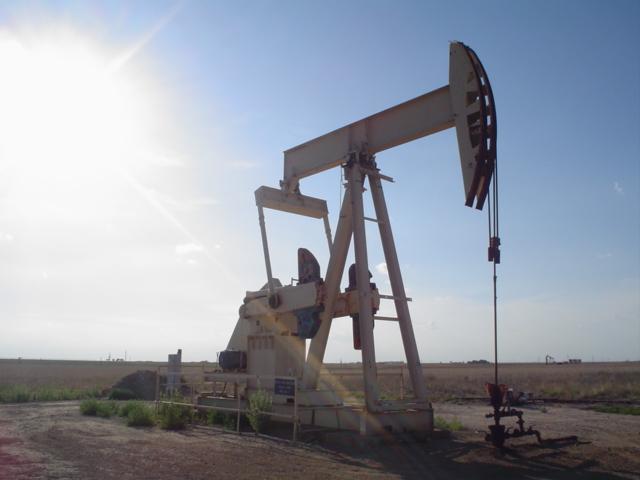Report: U.S. energy imports down, exports up; energy independence in sight?
U.S. domestic oil production, like from wells like this one in Texas, is increasing as the higher price of oil makes it more economical to extract U.S. oil. (Photo by Flcelloguy via Wikimedia Commons, cc-by-sa.)
Americans are driving less — and when they do drive they’re doing so in more fuel-efficient cars.
That means America’s using less gasoline, which means it’s using less oil — and the oil it is using is more and more coming from domestic sources, rather than from Venezuela or Saudi Arabia.
The United States is on the road to possible energy independence — something everything U.S. president since Richard Nixon has had as a goal.
In 2011, the country imported just 45 percent of its liquid fuels, down from a record 60 percent in 2005. According to a detailed report in Friday’s New York Times, the United States is producing more than 5.7 million barrels of oil per day. That’s up nearly a million barrels from 2008 and could grow to 7 million barrels a day by 2020. Some experts say it could grow as high as 10 million barrels a day, the Times said, which would put it on par with Saudi Arabia and Russia in terms of production.
Clifford Krauss, oil and gas business reporter for The New York Times, wrote in his report that if the United States could achieve energy independence, it could completely reshape American foreign policy and even the U.S. economy — though whether it could change prices is debatable.
“The bottom line is we’re producing more energy, particularly oil and gas, domestically, which was practically unthinkable even three or four years ago,” Krauss said.
Back then, American natural gas supplies were believed to be drying up and oil was being consumed at a blistering pace despite 20 years of declines.
“What’s happened is we’ve had this dramatic reversal to the point where we have this surplus of gas to the extent that we might be exporting it in the next couple of years,” Krauss said. “And oil production is going up significantly every year.”
That, coupled with a decline in consumption, and America is becoming vastly less dependent on imports. Even if the economy picks up, he says, that decline will continue as Americans take older fuel guzzling cars off the road and replaces them with modern vehicles. That trend, Krauss said, should only accelerate if the economy really resumes growing.
Plus, “we’re telecommuting. We’re shopping online. Young people seem much less interested in socializing in their cars than my generation,” Krauss said.
A recent analysis from Citi Group found that the dramatic spike in domestic oil production could produce dramatic economic benefits, including boosting GDP, creating some 3 million jobs and increasing the value of the dollar.
